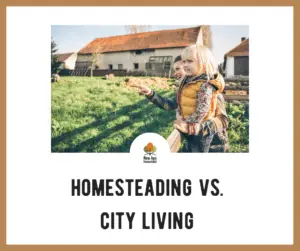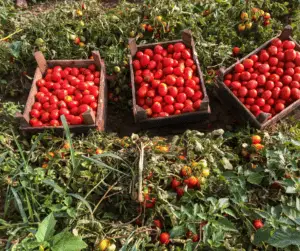If you’ve wondered what the differences are between city living and homesteading, this article will explain it and tell you why homesteading is better.
If you’ve taken a look at homesteading and it’s piqued your interest, then you’re probably wondering what the differences are between city living and homestead living.

The most significant part is that homesteads are entirely off-grid, but there is much more to it than just that.
The only similarity the two have in common is a place to call home; otherwise, it’s like comparing a snake to a lion. I’ve lived in all sorts of areas, some of them being entirely off-grid.
This allows me to speak from a first-hand perspective; this way, you can understand the two and what makes them unique.
I’ll also be explaining why homesteading is better, although, for some, this is a personal perspective; I do think that homesteading has an edge, and I’ll explain why. Let’s jump into it.
City Living: What It’s Like?
You Have Immense Luxuries
This article may be why homesteading is better than city life, but we must admit, the city offers many luxuries hard to pass up. Immediate access to cable, electricity, and the internet is just the basics of the town’s amenities.
Things like living just five minutes away from a big box store that offers just about anything you’d ever need is massively convenient, but this comes with a cost. The cities of America are the most populated areas in the nation.
This means that you have to share the area with thousands of other people. This leads to less available space, more regulations, less freedom, and high living costs due to the competition of other residents renting and buying property.
Preparation Is Not Common
In a perfect world, preparedness would not be significant. Earth comes with its issues, though. People who reside in cities of all sizes rarely find it necessary enough to prepare for disaster. Aspects like food storage, water access, and survival tools and skills are alien to most.
This is a disaster waiting to happen. If we take a look at our disasters in history, those who were prepared often prospered. Nevertheless, the city creates an environment that makes preparedness look like a waste of time.
Part of this is due to the sheer amount of immediately available luxuries, which leads to a lack of preparedness. Although the hope is that we never need to use our tools and skills stocked up for disasters, these are critical yet are lacking for those residing in the city.
You’re Flooded With Bills
If there is one thing that every individual living in the city knows well, it’s paying bills. It’s not as simple as paying for everyday necessities like electricity or water, though. Many people, especially those who live in apartments or condos, must pay out on things like HOA fees.
Some people may even have to pay extra rent for any pets that they may have. Plus, those who live in the city are much more likely to have more unnecessary bills that pay for luxuries like rent to own furniture, lawn services, and much more.
I know many people that spend money just so they can keep up with others, who spend money they don’t have just to show off. I’ve got news for you; no one can make you feel like you need to “show off” if you live on a homestead.
Everything Is Nearby
If you’ve ever lived far out of town and suddenly moved to the city, you quickly discovered that things that used to feel like a full-on adventure, such as heading to the town just to pick up eggs, is no longer in the equation.

Living in the city completely dismantles this; if at any time you need food, supplies, or gas, the store is likely just minutes away at most. This can also cause some people to spend more money since it’s so easy just to hop over a block or two, spend fifty bucks, and return.
It sort of takes the fun out of going to the store because it becomes a regular occurrence. However, it doesn’t come without good things, too. You have many more opportunities to experience new and unique experiences in the city, but it doesn’t exist without its downfalls.
It’s Often A Rush
If I had to explain city life to the Amish, the first thing I’d mention is that it’s nearly always a rush. Jobs are often fast-paced because of so many tasks that need to be done, not to mention the constant rat race that is commuting.
The stores are frequently crowded and hectic with people running over each other just to grab the last pack of donuts, and the traffic is like a modern jungle of squirrels flying from one tree to the next, rushing to get the last nut from the tree.
It’s not always like this, but to say city life is slow and relaxed is farthest from the truth. This isn’t always a bad thing as humans love to socialize, but it cannot compare to the quiet and comfortable feel that a homestead offers.
Homesteading: What It’s Like? (And Why It’s Better!)
You’ll Experience The True Outdoors
Experiencing the outdoors is possible if you live in the city. However, you never become fully immersed this way. Homesteading and the lifestyle that it requires means that you’ll be fully engaged in the outdoors nearly 24/7.

This is great because you’ll discover things about wildlife, mother nature, any other cool aspects unlike ever before. You may even learn a few useful skills to apply to everyday life and homestead chores.
Plus, you’ll have the ability to hunt, fish, or whatever else that is outdoors related whenever you choose. That in itself makes it all the more worth it because outdoor life basics are rarely available, even if you rent a cabin. You have to be in it, from the inside.
Efficiency Will Become The Normal
If you’re considering building a homestead, then there is one thing to take away from this article; it’ll require efficiency like no other. For one, food may not be as freely acquired as it is in the city, so you’ll have to grow it, and this takes time.
You can’t just process an animal every day, either. All of this requires extreme efficiency, so you can expect to learn how to process, store, and eat conservatively. This also applies to time management as well.
If you think about the number of endeavors you’ll likely fall into while homesteading, time management will become a strong skillset of yours. Things like power banks, water storage, and other necessities are also a part of this. It’s okay, though; who doesn’t love to be efficient?
It Lets You Grow Your Own Food
The best part about a homestead is that you can live entirely off the land; this includes the garden, farm, and other food supply methods. Many homesteaders grow a garden filled with fruits and vegetables, ranging from tomatoes, beans, cabbage, watermelons, and more.
It’s a fantastic method that is easy to start and can quickly provide for a family if it’s large enough by the first year. Greenhouses are also a popular option among homesteaders; this way, they can still have a garden even when the climate is unforgiving.
Let’s not forget about livestock, which, if you choose to, will provide you with eggs, cheese, beef, pork, chicken, and leather to name a few. It’s not easy, but it’s very worth it for those willing to put in the hard work to maintain it all. Nonetheless, it’s a significant part of homesteading.
It’ll Be Entirely Off-Grid
The best part of a homestead for most people is the fact that they’re entirely off-grid. This means that you leave behind all the connections via cable, wire, and piping often used in the city and trade it for nature, leaving those luxuries behind.
Many replace it for local grid opportunities like solar panels, water wells, and water pumps. You’ll also unlikely buy food at the store since most if not all of your food and water will be locally supplied. After you have set up everything, it’ll all be much more comfortable.
The costs of the initial setup can be high, but if you play your cards right, it can all be set up at an affordable price. You should also keep in mind that even though it costs to set up your local grid, you’ll save thousands of dollars in the long run.
You Will Work Hard
It shouldn’t come as a surprise, but if you plan to build a homestead, you should know that maintaining it will not come easy. This isn’t necessarily a bad thing, though. It will teach you discipline and make you a stronger, healthier person.
The livestock, garden, the processing of the food and water supply will all take some work to maintain, and this does not include any other aspects like maintaining the land or home itself. You’ll likely reach a point where you become addicted to trying new challenges.
Nevertheless, I’ve never seen anyone complain about this process because, in the end, it’s your home, and each time you work on it, it makes it even more so your haven. The freedom that a homestead gives you is unlike anything else.
Frequently Asked Questions
Do I Need Outdoor Experience To Homestead?
Anyone can start a homestead, no matter what they’re outdoor background looks like. That’s not to say that those with experience won’t have an easier start, though.
It just makes for more learning, which is fun initially. You’ll have a lot to learn, but no one really ever stops learning.
Plus, you’ll always have other homesteaders there to help you if you need it. That’s a big plus about homesteading; it includes a great community if you welcome it.
Which States Are Best For Homesteading?
Click here for the top 6 states, but while we’re already speaking of it, I’ll recommend a few factors to take into consideration before you choose a state to settle your homestead in.
First, you’ll want to make sure it has relaxed gun laws, homestead friendly taxes, and a good climate for both the livestock and garden.
Natural resources are also essential to factor in; creeks, rivers, wildlife, and other aspects are critical to a successful homestead.
How Can I Start A Homestead?
This is a complicated question because there are so many questions to give answers to, but if you want to start a homestead, you’ll first want to find an affordable piece of land.
You’ll then want to take a look at the local laws and regulations of building a homestead. You should make sure the land has plenty of natural resources and a livestock/garden friendly climate.
Building the homestead should take an off-grid approach, with solar and off-grid water systems in mind. This way, nature can allow you to survive and enable your homestead to thrive.
Verdict
Anyone can do homesteading, and it allows those tired of the rat race in the city a place to call home, without relying on anything but nature itself. Many people start a homestead for various reasons.
It can be due to a desire to escape regulations, the thirst for being non-dependant on the grid, staying away from the city in case civil unrest occurs, having the ability to live off of the garden and livestock, or just to have a simple, quiet place to call home simply.
I know from experience that nothing compares to the simplicity of off-grid living. If you’ve wanted to start a homestead, I say go for it; but before you do, perhaps try renting a small cabin.
This will not provide the full homestead experience, but it will give you a little taste of what to expect.
Nevertheless, if you’ve learned anything today or have anything you’d like to share with us or others, feel free to express it in the comments below. Cheers!

